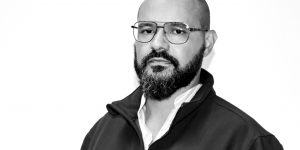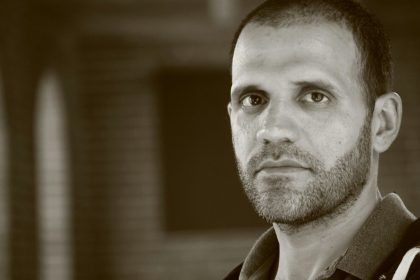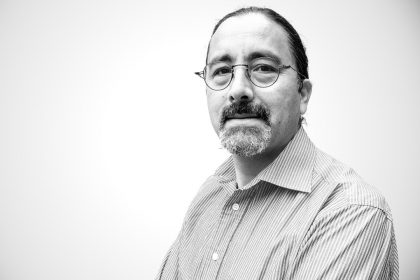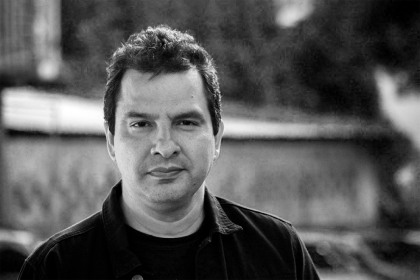ABOUT THE AUTHOR:

Keymer Avila
Lawyer (UCV) Master's Degree in Criminal Law Sociology and Criminology, UB (Barna). Researcher at @cpenalesucv and Professor at @criminologial in Pre and Postgraduate UCV.
Professor Keymer Ávila is a Researcher at the Institute of Criminal Sciences at the Central University of Venezuela and a Professor of Criminology at the same university. He is one of the foremost scholars and critics of institutional violence and criminal justice policies in current-day Venezuela. In part 1 of this interview, Venezuelan Workers Solidarity members Elvira Blanco and Alejandro Quryat asked him about the nexus between racism and state violence in our country for No Borders New as part of our look into global anti-racist struggle in the wake of the Black Lives Matter uprising in the United States. Part 2, below, explores what has changed and what has not changed in terms of racism and policing under the Chávez and Maduro governments. All notes between brackets by the translators.
Elvira Blanco and Alejandro Quryat: You say that there was “a deepening of everything that was already profoundly wrong.” What policies led to this? What transformations happened in police institutions under Chavismo, that would explain this rise in homicides at the hands of the police?
Keymer Ávila: As I mentioned earlier, the decades of the 1960s, 1970s and 1980s were not a fairytale and Venezuela was not Disneyland. From 1998, and at least until the death of President Chávez, the dominant discourse in approaching the problem of public insecurity was one with a social focus. Starting in 2013, the Government’s discourse became much more repressive, ideologically very near to that of its alleged adversaries. Thus, we can clearly distinguish two stages in the discourse and the official policies regarding public safety in twenty-first century Venezuela.
A first stage can be identified between 1998 and 2013, beginning with the first government of President Chávez, who succeeded in capitalizing on the discontent with the political system as a whole. Chávez transformed that discontent into hope through a project that promised radical transformation and rupture with the previous order. This involved the “refoundation” of the Republic, a new Constitution, and a series of institutional reforms. The political and the social were the topics of discussion. “Public safety” was not on the agenda, and when it was broached, it ended up diluted in the discourse of social policies. The line followed the classical social sciences Mertonian discourse: the lack of opportunities creates conditions for the most impoverished to commit crimes. What does this recipe call for, then? To improve the living conditions of poor.

As a consequence, the focus, apparently, was placed only on the social, on topics of inclusion, while neglecting attention to the spaces of security proper: the police forces, the Criminal Investigations Body (CICPC), the public prosecutors, the courts, and the prisons. All of these remained the same, unaffected by changes, following the same erroneous trajectories and progressively becoming powerful autonomous fiefdoms from the state as a whole. Though this was not a novelty of the Chávez government, the process became more acute, in a sort of continuity of a process of institutional precarization and decay.
In the field of legislation, the rationality of previous governments was maintained: increases in sentencing guidelines, decreases in welfare, broadened criminalization of behaviors, etc. Far from contributing to the improvement of the criminal justice system, all of this overburdens it, making it slower and more arbitrary and violent.
From an ideological standpoint, it is important to highlight that the rhetoric of some of the allegedly progressive public opinion shapers, who attempt to locate a cause-effect link between poverty and violence, inadvertently coincides with classist, conservative, and right-wing discourses, while seeming to superficially suggest that the state should only intervene socially. Critical criminology – especially its English strand – began to overcome this idea towards the end of the 1970s, and with it a romantic and idealized vision of the criminal: it set itself the task of analyzing, understanding, and intervening in concrete criminal justice politics. This gave way to a more acute awareness of the fact that those most affected by violence and lack of safety are the most impoverished themselves, and that something must be done about this.
However, this was the discourse that President Chávez adopted from his rise to power to the day of his farewell. The causes of violence were understood to be factors associated with exclusion, inequality, poverty, and lack of opportunities; as a consequence, the priority was to reduce these factors. Beyond the issue of public safety, what we must ask nowadays is whether, through all those years, these needs were genuinely fulfilled in structural, universal, institutionalized, permanent, uninterrupted, and non-conjunctural ways – if the purported Social State effectively came to be and if it achieved sustainability – or, on the contrary, if these changes were just another conjunctural redivision of the oil rent in times of abundance.
In terms of discourses, criminal justice politics during this period were seemingly dissolved into social policies, without heeding one of the great warnings of the Alessandro Baratta, namely, that public safety policies must be integrated into the general social policies that encompass them. A public safety policy outside a framework of general social policies makes no sense. Social policies must not be confounded with public safety policies and social policies must not be “criminalized” through their elaboration from security spaces. This is a very common error, and a very tempting one, for allegedly progressive approaches.
On the other hand, general social policies that do not guarantee the institutional presence of the State as mediator and intervening force in conflicts as a defender of the most vulnerable in situations that threaten or put at risk the enjoyment of their rights can suffer internal crises, as happened in the Venezuelan case.
The most emblematic concrete public safety policy during this early stage was the 2006 creation of the National Commission of Police Reform (CONAREPOL). This Commission was created in the context of an election year that coincided with a rise in homicides in the country, and with three cases that shocked public opinion: Kennedy, Faddoul, and Sindoni. These cases, instrumentalized by the Opposition for electoral ends, all involved police officers, and the high profile of the victims meant that the demands for justice around their cases gained plenty of steam.
What was the Government’s response to these demands? The CONAREPOL. The creation of this commission was a correct political decision by the Government because, facing a crisis, it formed a consensus and exercised the elaboration of public policy in a serious and rational way. A new police model was designed, framed in legislation and in dozens of progressive resolutions between 2006 and 2013. With this impulse, a new institutionality was formed, in terms of narratives and forms. However, it is important to understand that the design of a policy is one thing and its implementation another. The police and military apparatuses maintain their own agendas, and have corporate, self-serving interests that any reform seeking to impose limits and institutional and legal controls upon their operations will affect.
Thus, while police reform was at the center of Government propaganda, in reality, a “counter-reform” by the State security forces was being carried out in the streets. This counter-reform, paradoxically, hid behind the “new model,” whose sets of norms were not applied. The new model was useful to show off in times of crisis, to touch up the appearance of the police force and to politically and socially re-legitimize it, and to refurbish its image in the press. Its merely discursive character served to make routine police practices invisible that ended up becoming more and more dangerous and damaging. In the sociology of Robert K. Merton, the process of police reform should fulfill clear functions of designing a new police model, dignifying its service, and making it consistent with the protection of human rights and progressive goals. But the CONAREPOL had several latent functions: to cover up what was happening in reality and to oxygenate and expand the police apparatus, while deepening its discretionary powers and militaristic logics. The idea of a “civic-military union” never ceased to be present in how these institutions were to operate in reality.
With the death of President Chávez in 2013, the social discourse and focus were put aside, along with references to the civilian and preventive “new police model,” in order to begin a new stage that runs to our days. Right away a different discourse was taken up that put aside the more social perspective to mainly focus on aspects of repression. The new president, Nicolás Maduro, made the topic of public safety a central axis of his policies.

The governmental discourses and criminal justice policies took a radical turn, ideologically approaching the right-wing “realism” popularized towards the end of the 1980s by Reagan and Thatcher. With this turn, the poor were transformed from victims into victimizers, to be treated as ingrates who, in this view, insisted on committing crimes despite the Government’s social policies. Through the prism of a more conservative left they are seen as “lumpen,” acting as an obstacle to the advance of the Revolution. These views would provide the ideological excuses for giving carte blanche to the military and the police to carry out a sort of “social cleansing” in which everyone who looks criminal must be neutralized through intimidation, incarceration, or physical elimination.
The Government has changed its “enemies.” Previously, it had all-powerful ones in “The Empire,” “Capitalism,” and “the bourgeoisie.” Nowadays, the enemies are the barrio poor, the ingrate “lumpen.” Thus, an “anti-imperialist” “class struggle” has morphed into an intra-class struggle that criminalizes poverty. In this way, the Government has hardened its policies of police and military control. It carries out militarized police operations against marginal populations, with increasingly deadly consequences, as I described in the previous answer. The most recent examples of these are the Operations for the Liberation of the People (OLP) and the actions of the Special Action Force (FAES).
Finally, the landscape of the past two decades confirms the existence of a structural problem in the continuity and implementation of policies. Over the course of fifty-eight years of “democracy.” Venezuela has had more than forty-three Ministers of the Interior . These, on average, last less than a year and a half in office. Evidence pointing to the consistent implementation of policies based on minimal institutional agreements that transcend the actors conjuncturally holding power is absent. The only continuity one can appreciate is the decay and corruption of the institutions that have recently reached new levels, increasing the vulnerability and defenselessness of citizens in the face of institutional and criminal violence, which are more and more difficult to distinguish from one another.
EB/AQ: In what ways do social and economic indicators (such as access to education, healthcare, employment, housing, among others) evidence discrimination against oppressed groups?
KA: Data and statistics in Venezuela are currently precarious. As I mentioned, the topic of racism has not been owned up to as a problem, so it is not addressed or registered.
According to the 2011 National Census, in terms of racial self-perception, only 2 percent of the population recognized themselves as “Black” or “Afro-Descendant,” while 49% identified as “Brown” . There is no consciousness of Blackness. This hinders the formation of strong organizations with anti-racist perspectives, as exist in the U.S. and Brazil. Consequently, debates, mobilizations, and struggles in this arena are rare, having limited reach and little impact.
Furthermore, in a context of a generalized crisis linked to the fulfillment of the most basic needs of the population, the ordering of priorities is also of a different nature. In Venezuela, over the past few years, social rights have regressed severely. The general scarcity of foodstuffs and medications correlates to the reappearance of diseases that were thought eradicated, such as malaria, diphtheria, measles, dengue fever, Chagas disease, meningitis, tetanus, and tuberculosis. Over the past thirteen years, the currency has been deflated over 100 million times, reaching an inflation rate estimated at over 1 million percent, similar to Germany in 1923 or Zimbabwe in the 2000s. According to the National Survey of Living Conditions (ENCOVI), between 2014 and 2017, poverty by income increased from 48 to 87 percent, while extreme poverty grew from 23.6 to 61 percent. In the last yearly report of the UNDP, only Syria and Libya, two countries suffering from prolonged wars, have fallen farther in the Human Development Index than Venezuela, which fell 25 spots between 2012 and 2018. The most recent report of the World Food Program places us as number four in the world with the most “urgent need of aid,” with 9.3 million people, 32 percent of the population, suffering from food insecurity.

EB/AQ: What movements are there in Venezuela today for racial justice, understood in broad terms? What dynamics do they take, what obstacles do they face?
KA: As I stated earlier, I think in the country, in general terms, there is a greater consciousness of class than of race. I suspect that some of the few organizations that exist are promoted by the Government or have been coopted by it as part of its official propaganda apparatuses. This makes their field of discourse an action quite limited. But it would be better if you asked a specialist on the topic about this.
EB/AQ: What is consciousness like in Venezuela with respect to racism in the United States, the Black Lives Matter movement, and the on-going rebellion? What meaning do discussions about these phenomena take on in the Venezuelan political context?
KA: I’m thankful for this question because it allows me to say several things I think are important, and that I don’t see addressed in public discussions.
Unfortunately, the national leadership has delivered Venezuelans into a situation of increasing defenselessness: the country is the object in imperialist disputes between the United States, Russia, and China. This objectifies the country in different ways: for the great powers and for their “progressives” it is a sort of laboratory where we as Venezuelans are the guinea pigs. At the same time, we find ourselves, in the terms of French theorist Michel Foucault, in an enormous institution of reclusion.
In this context, it is not only useless but naive to attempt to reduce this complexity to dichotomous visions of Government-Opposition, or even more ridiculously, of Right-Left politics. In reality, despite the enormous and increasing rejection faced by the government, the Opposition is almost non-existent. The government plays alone in the national chess-board, and little remains in it of a leftist character, beyond its aesthetics and the propaganda that some –thankfully shrinking – sectors of a conservative left still consume, whether from lack of knowledge or from complicity.
Thus, we see sectors that condemn police violence in the U.S., but legitimize and justify the slaughters that security forces carry out in Venezuela. These sectors are mirrored by those who justify police violence in the U.S. but vehemently condemn it in Venezuela. In the end, the fans of Trump and Maduro are quite similar on these topics as they both follow structurally authoritarian, repressive, and anti-democratic projects. They may define themselves as antagonistic, but they rather complement and legitimize each other, using one another’s excesses in their propaganda to cover up or justify their own crimes.
In Venezuela, for instance, the government uses the terrible case of George Floyd in its tirades and propaganda against the U.S. government, with the end of seducing some well-meaning dupes among international progressives. With this, they distract attention from the disaster that they have made in our country and the massacres that their own security bodies execute.
On the side of the more traditional Opposition, Black Lives Matter will not be well received because, in the end, these are conservative, racist, and classist sectors that agree with this type of excess against the excluded; they will only raise their voices when the victims are their own militants, middle-class youth in the context of a political demonstration, or when it is beneficial for their own media agenda. They care very little about the deaths of thousands of racialized and impoverished young people caused by police interventions.
As I mentioned earlier, I think that race consciousness is still in a state of gestation in Venezuela. The left in our country is predominantly and majoritarily conservative and Eurocentric; it does not ask itself these questions because race does not fit well in its cheat-sheet of “class struggle.” Moreover, much of it is in a process of self-destruction, having been coopted by the government’s apparatuses, logics, and rhetoric – hence their oscillation between justifications, denying reality, and an abetting silence towards the state’s excesses and human rights violations. Only minority sectors, with little weight, remain active in struggle. Fortunately, the international left and progressive sectors are becoming increasingly aware of what is really happening in Venezuela, and little by little have been putting aside automatic solidarities towards its government.
Institutional violence and human rights violations must always be energetically condemned. There are no good violators of human rights, and their behaviors should not be justified in any way. This double standard to condemn some excesses and justify others does enormous harm to societies and states, and to politics itself.
ABOUT THE AUTHOR:

Keymer Avila
Lawyer (UCV) Master's Degree in Criminal Law Sociology and Criminology, UB (Barna). Researcher at @cpenalesucv and Professor at @criminologial in Pre and Postgraduate UCV.




